 Petzlover
PetzloverAsian is originated from United Kingdom but German Rex is originated from Germany. Both Asian and German Rex are having almost same weight. Both Asian and German Rex has almost same life span. Both Asian and German Rex has same litter size. Both Asian and German Rex requires Low Maintenance.
Known also as the Malayan, the Asian cat is likened to the Burmese but just with different coat patterns and colors.
This particular cat breed was developed in 1981 in the UK. Apparently there was a mistake mating between a Lilac Burmese and a Chinchilla Persian and kittens from these were born in 1981.
So beautiful were they that a breeding program started with new coat colors and patterns. The breed got the name ‘Asian’ with all the varieties reaching GCCF Championship status.
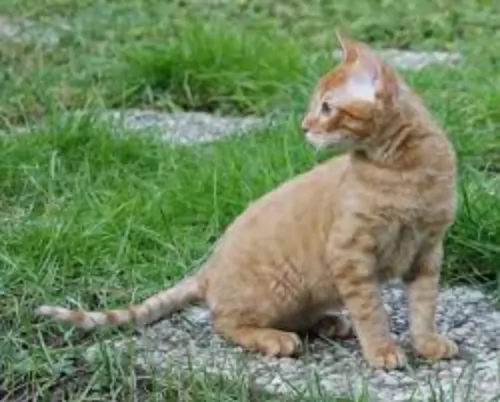 The cat originates from Germany and was developed in about the 1950s. Dr. Rose Scheuer-Karpin found a frizzy-haired black and white cat and chose to breed her.
The cat originates from Germany and was developed in about the 1950s. Dr. Rose Scheuer-Karpin found a frizzy-haired black and white cat and chose to breed her.
So as to fix the frizzy hair gene, it was decided to mate the cat further and this was the start of the German Rex.
It was later crossed with the Cornish Rex. The cats were recognized by the International Feline Foundation, but the Cat Fanciers' Association still associates the breed with the Cornish Rex.
The Asian cat is medium-sized and muscular. The male cat is somewhat bigger than the female and weighs roughly 5 – 7kg while the female will weigh roughly 3 – 5kg although most times, there is not much difference in size between the males and females.
The attractive cat has a round head and wide-spaced ears with large green eyes. It’s a slender cat, but athletic with slender legs and medium thickness tail. Asian cats come in a wide range of colors such as fawn, chocolate, black, blue, cinnamon. The coat is short, fine, and silky and the Asian doesn’t require too much grooming.
These are friendly, playful cats and they get on well with children if the children are kind, gentle and respectful with him. This is a fairly dependant cat and he will actually follow his favorite human being, crying out for attention.
The Asian is a social cat and can fit well into different homes. However, because it is a social cat, they require an owner that is willing to spend time with them. They’re cats that are sensitive to the moods of their owners and make excellent companions.
They’re adventurous cats and enjoy exploring and traveling, voicing their opinion on different things as well. The Asian thrives on the attention it gets from their human owners. It’s a sociable cat and is quite talkative too.
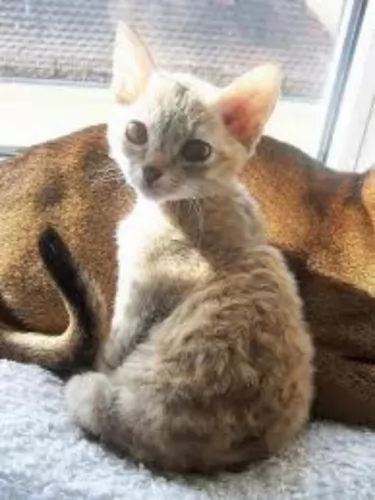 This is a medium-sized, muscular domestic cat with a well-developed chest. The cat can weigh between 3 and 6kg.
This is a medium-sized, muscular domestic cat with a well-developed chest. The cat can weigh between 3 and 6kg.
The legs are fairly long and slender but strong and the tail is thick and furry with a rounded tip. The head is round and the ears are large. The eye colors are always related to the coat color. The coat is short and silky and in many colors and it has a tendency to curl.
These are friendly cats that form a strong bond with their human owners, although they are friendly towards strangers too.
They’re intelligent, lively, and playful too and will fit in well to homes with children.
Because of their playful nature, you want to ensure you provide them with lots of entertaining, stimulating toys.
They’ve got balanced personalities and are known for being sociable, adapting to the lifestyles they find themselves in. They will also get on well with other pets in the home, and enjoy being both indoors and outside.
The Asian cat is such a sweet animal – gentle and affectionate and also very sociable. They are also curious and intelligent and vocal enough to let you know their needs. They're strong-willed if they want something.
The Asian makes an excellent companion for singles, couples, families or the elderly. They also get on well with children and with other pets in the home.
There are quite a few Asian cat varieties and each one promises to make you an excellent companion.
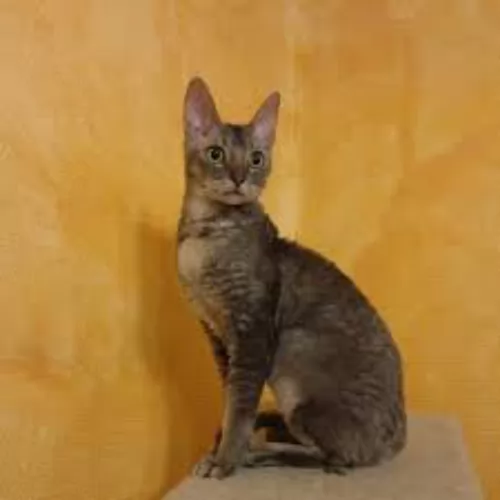 Your German Rex is everything you want in a pet. He is a cat that loves his human family and is prepared to offer loyalty and love in exchange for the same.
Your German Rex is everything you want in a pet. He is a cat that loves his human family and is prepared to offer loyalty and love in exchange for the same.
He is adaptable and undemanding. Before you invest in such a cat, understand that interaction from you is highly important, so if you don’t have time for an adult pet, it would be kinder not to get this particular cat breed as they crave lots of attention,
Although there are no specific health issues with this cat, because of it being associated with the Burmese, it may be more susceptible to diabetes mellitus than other breeds.
There are many cats in modern times developing diabetes mellitus – where they are unable to produce enough insulin to balance blood sugar. If the disease goes untreated it can lead to dehydration, vomiting, depression, weight loss, and even death. Your cat will be thirsty and urinating more frequently. There are various treatments and the diet for the cat will need to change too.
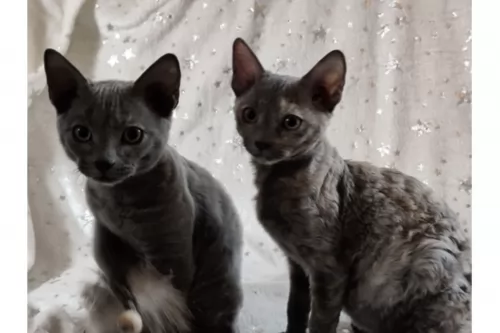 With excellent care and lots of love and attention, your German Rex can reach up to 17 years of age. They aren’t prone to any particular diseases, but diet plays a massive role in their health.
With excellent care and lots of love and attention, your German Rex can reach up to 17 years of age. They aren’t prone to any particular diseases, but diet plays a massive role in their health.
Remember that obesity is a major disease and it in itself can contribute to a host of other illnesses in cats and shorten its life. Excess weight contributes towards arthritis and diabetes and just losing a bit of weight can contribute towards increased mobility.
Dental disease is a common, chronic problem and you need to ensure your pet’s diet promotes dental health. It can be extremely stressful for your cat to have his teeth brushed, but in the case of chronic dental infection, get your pet to a vet.
To take care of the cat’s shiny coat, you can gently brush your Asian every week, not more, as they are short-haired cats, they’re not heavy shedders and they are low maintenance.
Age and general health will influence the way you feed your Asian cat. You’ll want to be feeding your feline friend the very best food there is as this will contribute towards his good health.
If you opt to feed your cat a commercially manufactured cat food, higher protein levels in wet foods might be better for your carnivorous pet. You don’t want to provide your cat with a high protein diet that is deficient in amino acids.
That is why it is important to research cat foods and their ingredients and get to know what are the most important ingredients for your cat to be getting. At all costs, avoid your cat becoming obese.
Make sure your cat has access to fresh cool water to maintain his body temperature.
Check your cat’s teeth, as he can’t convey to you that he is in pain – you need to check inside his mouth. Redness inside his ears might be indicative of an ear infection.
Whenever your cat seems to be ill, get him to the vet.
Provide your cat with a litter box that is kept hygienically clean.
Provide your cat with food- and water bowl, a brush for grooming and warm, dry sleeping basket.
Have your Asian neutered or spayed to prevent unwanted kittens.
Make sure your cat’s vaccines are up to date.
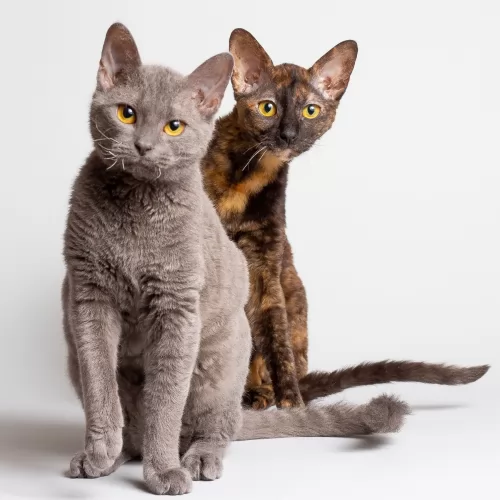 The German Rex is a shorthaired breed so a gentle brush once a week will be quite adequate.
The German Rex is a shorthaired breed so a gentle brush once a week will be quite adequate.
As you groom your German Rex, feel for any unusual lumps and make sure there are no signs of sores or rashes on your cat.
Check inside his ears for wax and dirt buildup and signs of redness for infection. If you don’t like to clean the inside of your cat’s ears, there are professional cat groomers and your local vet who will do this for you.
Make sure you feed your Rex the best cat food there is. When you look at the commercially cat manufactured foods there are, you’ll notice that there is dry kibble for cats as well as wet-type foods.
Through trial and error, you’ll learn what your cat likes, but your vet can offer valuable information on what is essential in a cat’s diet. Cats are carnivores so that means their diets have to be high in meat – protein – and low in carbohydrates.
Check out the best cat foods there are – the ones that have all the vitamins and minerals your cat requires to remain healthy.
Provide your cat with a litter box and keep it meticulously clean, scooping out the cat droppings every day and changing the actual sand or grit regularly.
Provide your cat with a warm bed, food and water bowls, toys, collar, and tag, climbing tree and scratching post.
Your kitten must start their first vaccines between 8 and 12 weeks of age. Your kitten will also be dewormed.
Take your cat to the vet when he is sick.